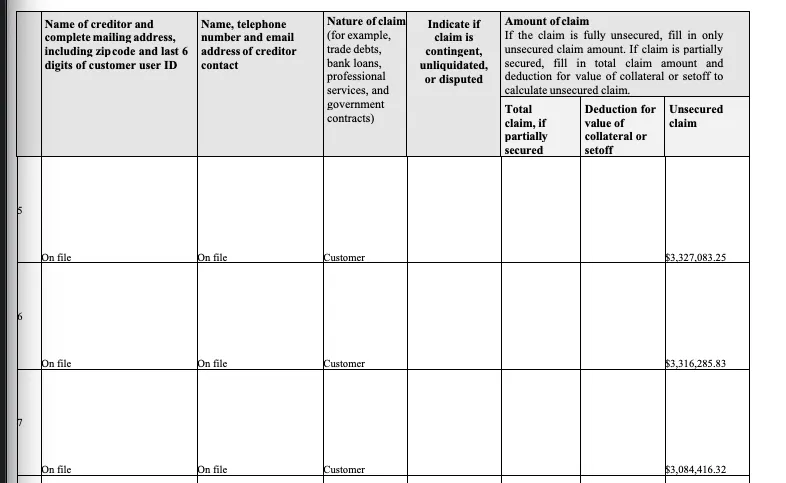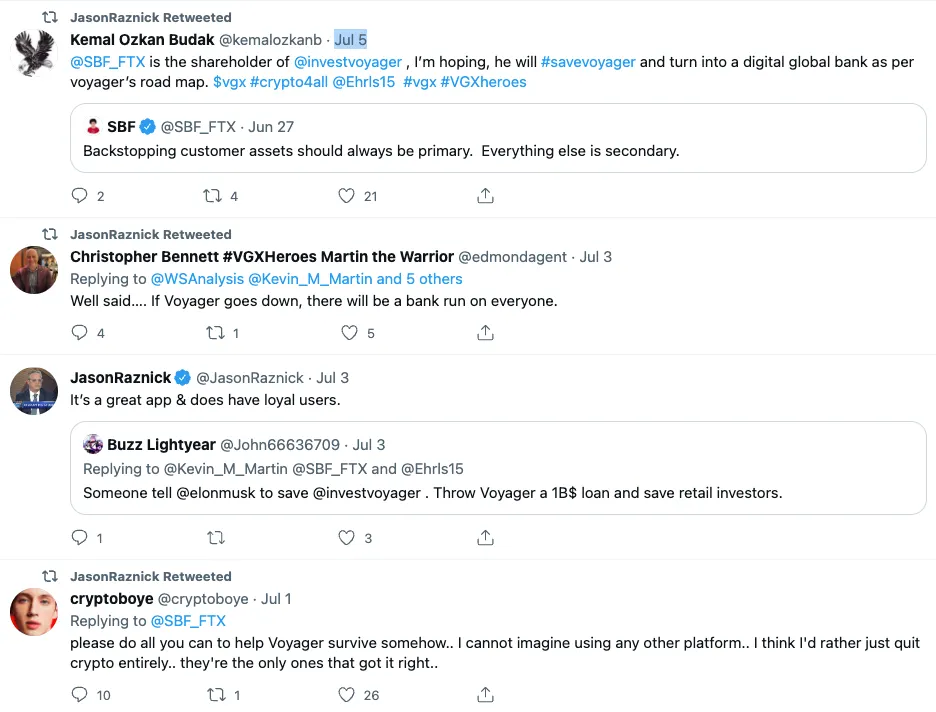Jason Raznick, CEO of media company Benzinga, has been named to the unsecured creditor committee in the Voyager Digital bankruptcy case, according to a recent court filing.
In chapter 11 bankruptcy proceedings, creditors’ committees normally consist of people and companies that have the seven largest unsecured claims against the debtor, in this case New Jersey-based crypto brokerage Voyager Digital.
It’s a significant role. One of the committee’s responsibilities is to come up with a plan for how the business will be reorganized—without which, the case cannot be concluded—or decide if the company should be liquidated.
Notably, a virtual court hearing on August 4, at 11 a.m. ET, will determine how long customers and creditors have to submit proof of their claims against Voyager. Parties wishing to participate have until next Friday, July 28, to file their comments in writing with the court.
So far, U.S. Bankruptcy Judge Michael Wiles has admitted a handful of attorneys from other jurisdictions to represent unsecured creditors in the case, which is being heard in the Southern District of New York.
On Wednesday, the judge approved attorney Paul R. Hage, of Jaffe Raitt Heuer & Weiss in Michigan, to represent Raznick, whose media company is based in Detroit. The financial media publication has fewer than 200 employees and annual revenue of between $15 million and $25 million, according to data from SimilarWeb.
"I’d rather not comment on the case at this point," Hage told Decrypt in an email. "The committee was just appointed yesterday and is focused on interviewing and retaining professionals to help them maximize the recovery to the parties who they represent," he said.
In an emailed statement to Decrypt, Raznik said: "I am bringing my passion for serving the individual investor to the creditor committee to drive the best outcome for ALL stakeholders."
Raznick wasn’t named as an unsecured creditor in the initial bankruptcy filing from Voyager Digital CEO Steve Erhlich on July 6. But neither were a lot of the Voyager’s largest unsecured creditors.
Besides identifying a $75 million claim from Alameda Research (which also owes Voyager $377 million and extended the company a line of credit worth $500 million) as the single largest unsecured debt and a $1 million claim from Google as a vendor, the filing doesn’t identify any other of the 50 largest unsecured creditors.
The fact remains that Raznick likely wouldn’t have been appointed to the creditors’ committee unless he had one of the largest claims against Voyager, ranging from $3 million to $10 million.


For his part, Raznick has been quiet about his involvement in the Voyager bankruptcy. But at the start of July, social media posts suggest he wanted to see the company survive.
On July 5, a day before Voyager filed its petition for chapter 11 protection, Raznick retweeted messages calling on Bankman-Fried to “#savevoyager.”
“It’s a great app & does have loyal users,” Raznick wrote in a July 3 tweet, quoting a Twitter user who suggested that Tesla CEO Elon Musk, “throw Voyager a 1B$ loan and save retail investors.”

A few weeks earlier, on June 13, Voyager Digital CEO Steve Ehrlich did a live interview on the company’s YouTube show, “Benzinga Live,” a day after the now insolvent crypto lender Celsius announced that it had frozen customer withdrawals to “stabilize liquidity.”
After some connectivity issues, Ehrlich can be heard making a statement that Voyager has ended a previously announced partnership with Celsius.
“Our platform is working just as normal. Our partnership with Celsius ended a while ago, so our customers’ assets are safe and we’re processing everything as normal,” he told Benzinga Live host Aaron Bry. “That relationship dissipated over the last few months and we have very little [to] no customers assets at all, over at Celsius.”
In the video, Ehrlich goes on to say he thinks US Dollar Coin (USDC) is the only stablecoin “worthy” of a company like Voyager.
It would later be hedge fund Three Arrows Capital, also known as 3AC, defaulting on a $670 million loan, in large part because it lost $200 million in the collapse of Terra's algorithmic stablecoin UST.
“The Terra-Luna situation caught us very much off guard,” 3AC co-founder Kyle Davies told The Wall Street Journal in June.
Voyager CEO Ehrlich goes on to say in the video that the fact that his company is public means investors have more transparency into how their money is being handled.
“We’re transparent as all can be,” he said.
On July 1, after issuing 3AC with a default notice, Voyager halted trading and withdrawals of customer assets. Since Voyager filed for bankruptcy on July 6, more than 30 letters have been submitted to the bankruptcy judge overseeing the case—many of them from Voyager customers asking for access to their money.
“I feel as though I'm being strategically robbed in a civil way by Voyager Digital,” wrote customer “Analicia V” in a letter filed with the court on Wednesday afternoon.
Editor's note: This story was updated after publication to include a statement from Benzinga CEO Jason Raznick.

